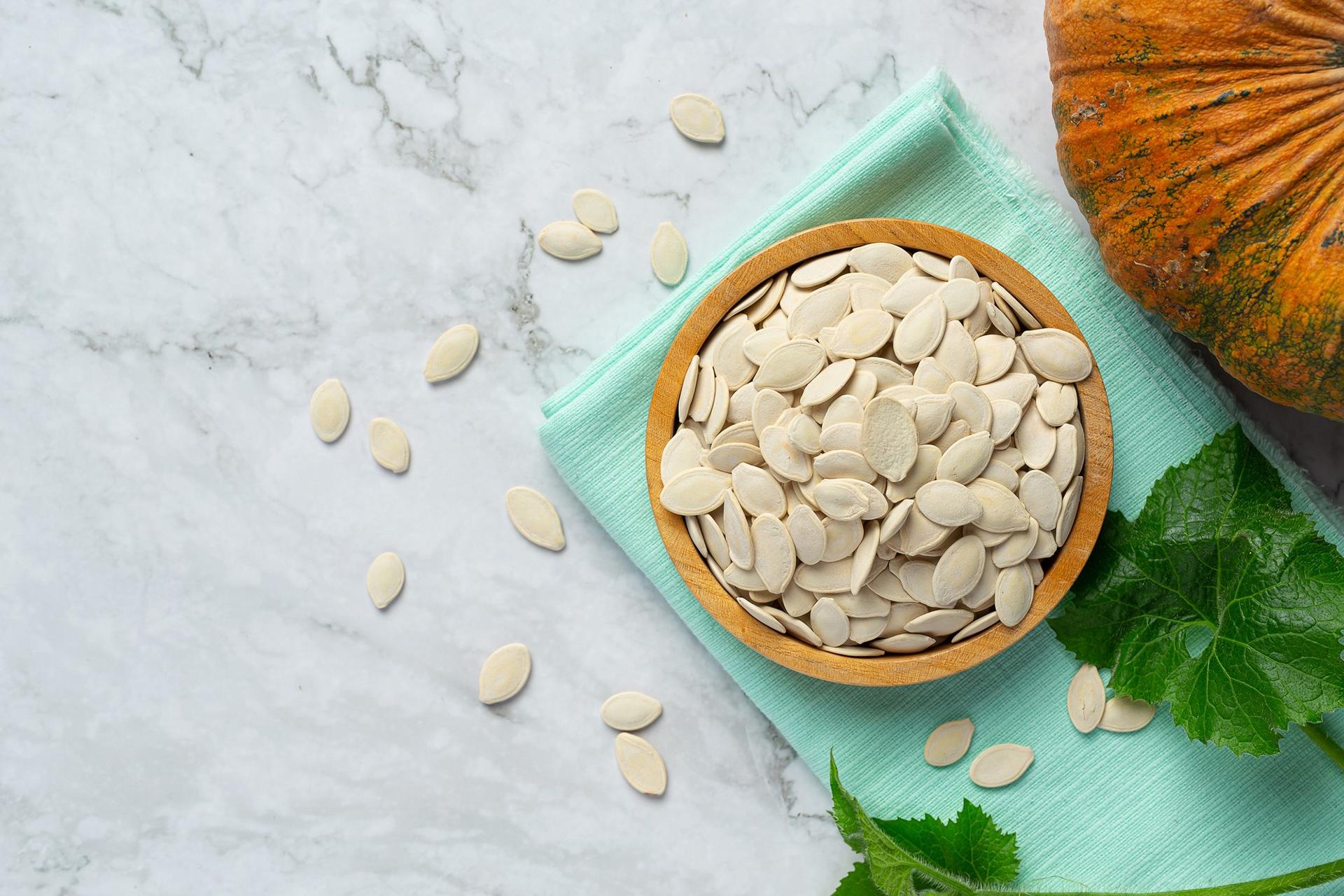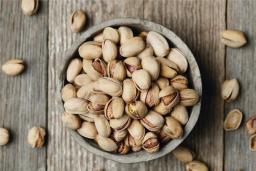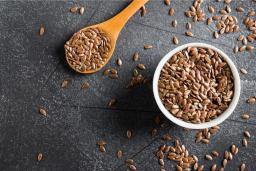Pumpkin Seeds: Health Benefits, Nutrition & Ways to Consume
Key Takeaways
- Pumpkin seeds are rich in zinc, phosphorous, and magnesium
- Pumpkin seeds’ nutrition benefits both women and men
- Consuming pumpkin seeds can be a part of your nutrition therapy
Pumpkin seeds have been in use for over 7,500 years. Modern studies confirm there are many pumpkin seeds benefits for females and males. It has been traditionally used for the treatment of the following.
- Kidney stones
- Parasitic infections
- Hypertension
- Urinary tract infections
- Bladder infections
These tiny seeds pack a punch of nutrients and nutraceuticals. These include amino acids, unsaturated fatty acids, phenolic compounds, and minerals [1]. A small number of seeds as a nutrition therapy can reduce the risk of certain chronic diseases.
Researchers also acknowledge their ability to provide the right nutrition for children. For instance, pumpkin seeds during pregnancy can help in the healthy growth of the baby. This is because they contain zinc which boosts immunity. For details about pumpkin seeds' nutrition and benefits, read on!
Pumpkin Seeds Nutritional Value
Pumpkin seeds are beneficial to humans in a variety of ways:
Each serving, or around 30 grams, has 151 calories. The 30gm portion, or about one-fourth of a cup, is a good source of fiber and protein
One hundred grams of seeds have a calorie count of 574, 49, 6.6, and 30 grams of protein, fat, and fiber. Most of the fats are polyunsaturated and monounsaturated, both beneficial to health
Vitamins, including vitamin B1, vitamin B2, vitamin B3, vitamin B5, vitamin B6, vitamin B9, C, E, and K, are all found in variable concentrations in pumpkin seeds
The other minerals in pumpkin seeds are calcium, iron, magnesium, manganese, phosphorus, potassium, sodium, zinc, and more
They also contain nutrients and plant compounds that positively affect your health
One Serving of Pumpkin Seeds offers the following nutrients:
| Nutrient | Amount | Percentage of RDI |
Fibre | 1.5 grams | - |
Carbs | 2.10 grams | - |
Protein | 3.70 grams | - |
Fat | 6.80 grams | - |
Sugar | 0.20 grams | - |
Vitamin K | - | 18 % |
Zinc | - | 23% |
Magnesium | - | 37% |
Iron | - | 23% |
Copper | - | 19% |
Manganese | - | 42% |
Phosphorus | - | 33 % |
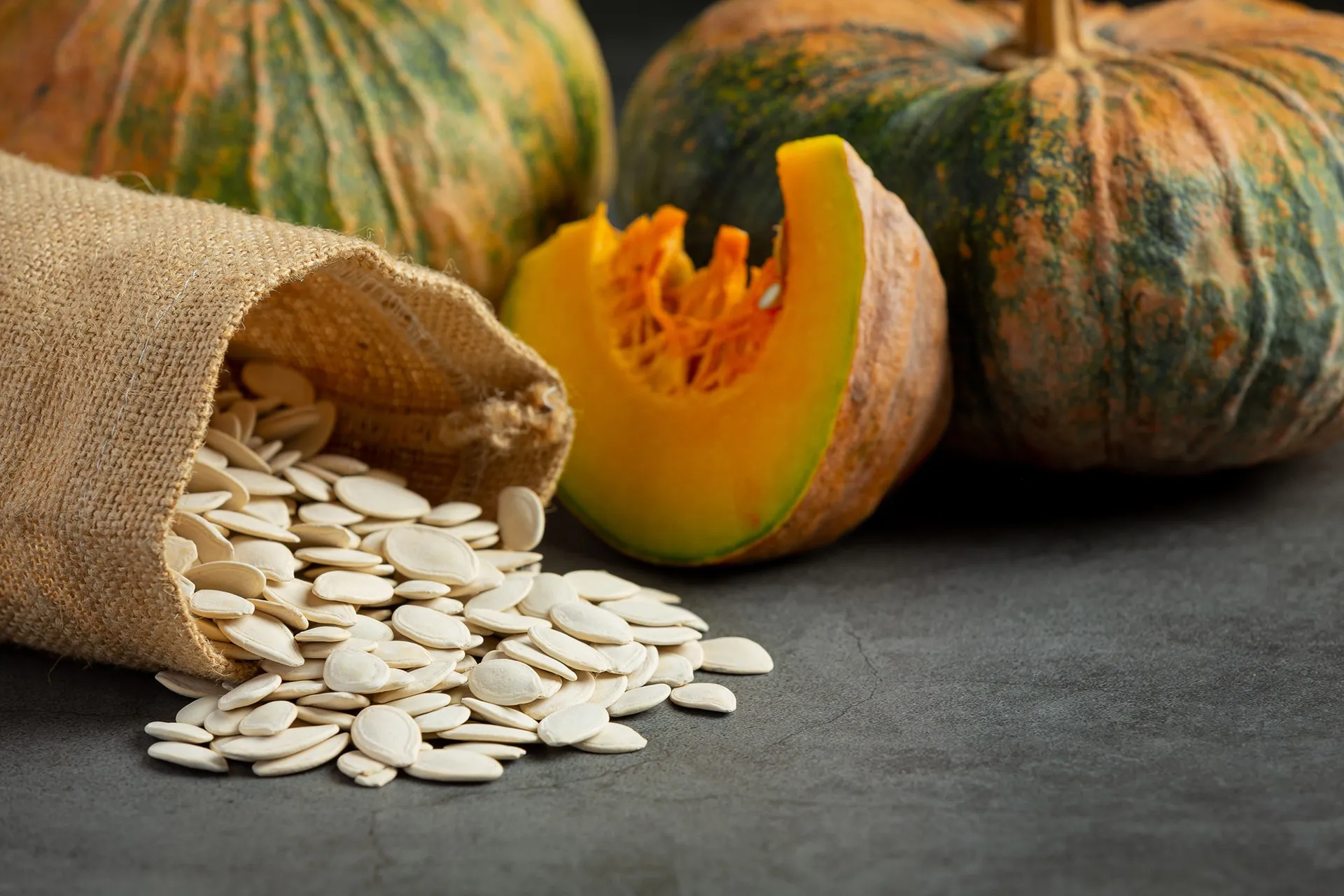
Health Benefits of Pumpkin Seeds
Reduce Blood Sugar Levels
Older animal research has demonstrated that the consumption of pumpkin, pumpkin seeds, pumpkin seed powder, and pumpkin juice can lower blood sugar levels. [1]
In one study, it was observed that healthy adults who ate meals containing 65 g (or 2 oz) of pumpkin seeds had less blood sugar levels after consuming a high-carb meal.[2]
It is interesting to note that pumpkin seeds will help control diabetes because of their high magnesium concentration.
According to significant observational research conducted over a 28-year period, individuals who drank the most magnesium had a 15% reduced chance of acquiring type 2 diabetes than the people who took the least. [3]
These advantageous benefits of pumpkin seeds on blood sugar levels still require further study to be confirmed.
Boost Your Immunity
Zinc and vitamin E found in pumpkin seeds help to strengthen our immune system.
Two advantages of vitamin E include boosting immune responses and avoiding a number of viral diseases. It is also a strong antioxidant that guards the healthy cells in our bodies from harm brought on by free radicals.
Inflammation, allergies, and pathogen invasion are all things that zinc shields our bodies from, preventing infections and boosting immunity all around.
Helps You Loose Weight
In Pumpkin seeds, there is an abundant amount of protein and fibre. As a result, they make us feel fuller for longer, making us eat less and consume fewer calories. This aids in weight loss.
Strengthens Bones
Magnesium is abundant in pumpkin seeds. Magnesium helps bones develop and become strong. According to a study, diets high in magnesium are associated with greater bone mineral density. [4] By doing this, dangers like osteoporosis and bone fractures are reduced.
Low magnesium levels have also been linked to increased inflammation. In addition, the blood's calcium levels also drop due to magnesium shortage. Up to 262 milligrams of magnesium may be found in every 100 grams of pumpkin seeds. This quantity is sufficient to meet 65% of your daily magnesium needs.
In postmenopausal women, it also aids in osteoporosis prevention.
Provides Anti-Inflammatory Benefits
The vitamin E and carotenoids in pumpkin seeds contain antioxidant properties. They help reduce inflammation and protect your body from free radicals. As a result, you can stay safe from many diseases. Pumpkin seeds are also rich in dietary fiber, which enhances the anti-inflammatory effects. These help improve the functions of your bladder, bowel, joints, and liver.
Reduces Diabetes Risk
The magnesium content in pumpkin seeds can help maintain blood sugar levels. A controlled sugar level lowers your risk of diabetes. Eat pumpkin seeds or add them to your diet to get enough magnesium. This can help diabetics who are unable to control or maintain their blood sugar levels. In fact, a study covering 1,27,000 people reported the impact of a magnesium-rich diet on type 2 diabetes. The findings suggested significant lower risk of type 2 diabetes in men and women [2].
Lowers Risk of Cancer
Cancer is a life-threatening disease that can affect the life of a person. It also impacts the family members of the patient. You can consume pumpkin seeds to prevent or reduce the risks of the following cancers.
- Prostate cancer
- Colorectal cancer
- Lung cancer
- Stomach cancer
Pumpkin seeds may also lead to a decrease in breast cancer risk among postmenopausal women [3].
Supports Heart Health
Including pumpkin seeds in your diet helps in reducing the risk of stroke and types of heart diseases. This is because they are a good source of magnesium. The magnesium content helps regulate and lower your blood pressure. The antioxidants in these seeds are also linked with an increase in nitric oxide. This helps in the smooth functioning of blood vessels, thereby reducing the risk of heart problems. Pumpkin seeds’ ability to raise nitric oxide levels in your body may lead to a positive impact on heart health [4].

Improves Your Sleep
Are you facing difficulties falling asleep? Pumpkin seeds may help. They are a good source of tryptophan, an amino acid known to induce sleep. In fact, consuming even 1g of tryptophan every day can promote sleep [5]. Further, the zinc, selenium, and copper present in pumpkin seeds can improve the quality and duration of your sleep. Also, the magnesium content can reduce stress and anxiety, thus helping you get good sleep.
Aids Prostate Health
Benign prostatic hyperplasia (BPH) is a condition that causes urinary problems. These problems occur due to the enlargement of the prostate gland. Consuming pumpkin seeds reduces symptoms of BPH and improves your life [6]. The rich content of zinc in pumpkin seeds also aids in lowering the risk of prostate cancer. Consuming pumpkin seeds every day improves urinary functioning [7].
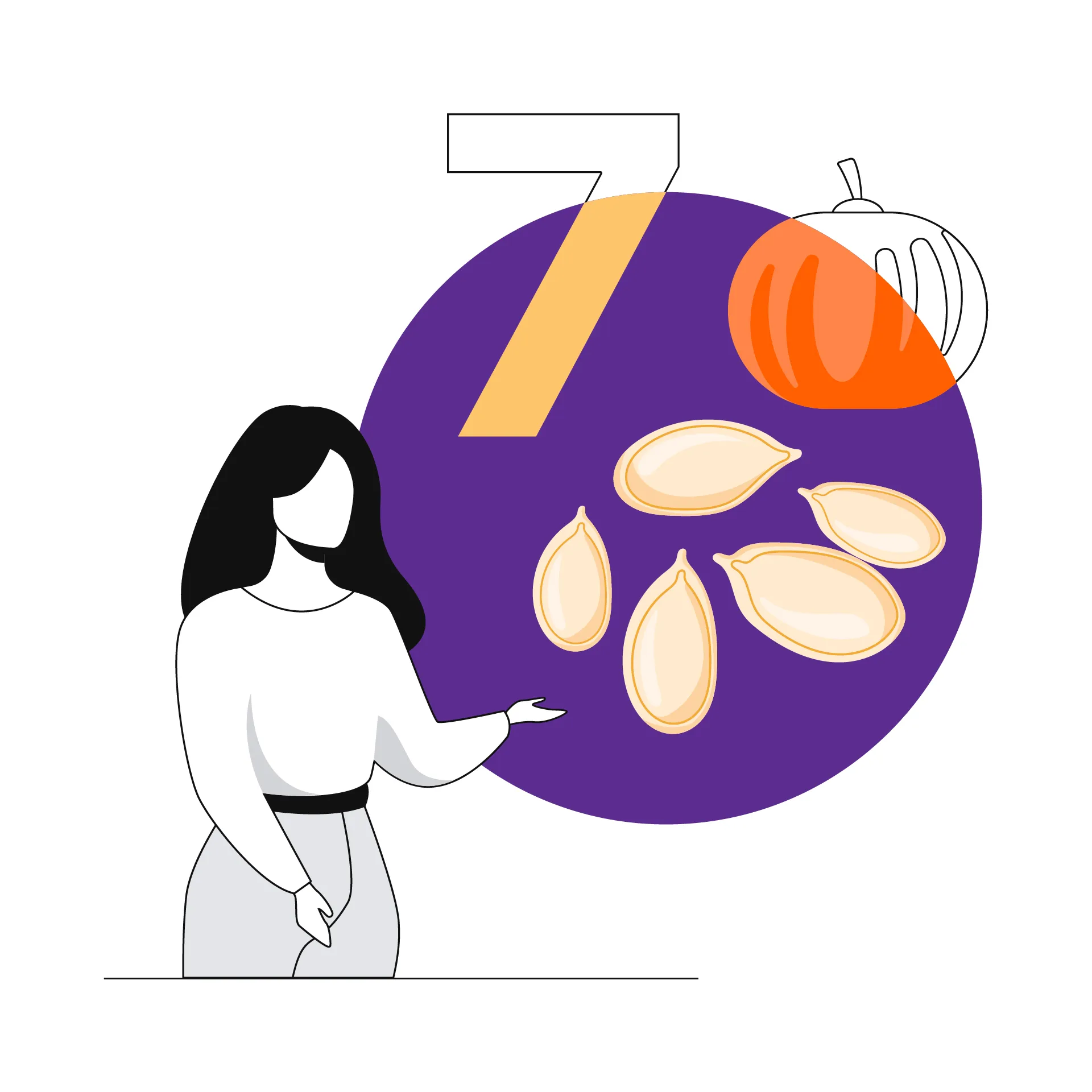
Boosts Sperm Quality
Pumpkin seeds are a good source of zinc, which helps improve fertility in men. Zinc may raise testosterone levels and improve sperm quality and quantity. The antioxidants and other nutrients in pumpkin seeds can also improve testosterone levels and boost overall health. Low levels of zinc in men can reduce sperm quality and increase infertility [8]. So, consuming pumpkin seeds may help to prevent them. With sperm booster foods you can improve sperm quality easily.
Additional Read: Pippali benefitsPrecautions to Take While Eating
Despite their miraculous qualities, not everyone enjoys pumpkin seeds. There are a few things to keep in mind before you include them in your diet plan:
Eat Wisely or You'll Lose All the Nutrition
It would be beneficial if you ate pumpkin seeds in the right way; otherwise, their nutrients would be lost. Try to avoid roasting your pumpkin seeds if you intend to.
You need to chew them thoroughly to receive the maximum benefit from them. They lose their water-soluble nutrients when cooked to a crisp or overcooked state. They lose riboflavin, vitamin C, thiamine, vitamin B6, niacin, and vitamin B12 as well.
Infants Should Avoid Consuming It
Although these small savory additives are fantastic for our health, they are not good for young children.
Fibre and fatty acids are not as beneficial for newborns as they are for adults. In babies, they can cause stomach aches, cramping, vomiting, and sometimes even diarrhoea. So despite being high in protein and iron, they are not suitable for newborns.
For Pregnant and Lactating Women
Insufficient information is available on the usage of pumpkin in medicinal doses during pregnancy and breastfeeding. They should take the pumpkin seeds as directed by the physician.
When Taken by Mouth
Pumpkin is probably safe to consume when consumed in food and when taken orally. For medicinal reasons, taking pumpkin seeds or pumpkin seed oil in limited dosages could be acceptable. Although they are rare, pumpkin-related adverse effects might include nausea, diarrhoea, and stomach discomfort. Additionally, it may cause rashes, itching, and allergic reactions in some people.
When Used on the Skin
There isn't enough trustworthy data to determine whether pumpkin seed oil is safe or what potential negative effects there may be.
In addition to the above points, people who are allergic to pumpkin seeds and those who suffer from hypotension and hypoglycemia should not eat pumpkin seeds.
Ways to Consume Pumpkin Seeds
Pumpkin seeds are not only vegetarian and vegan but also incredibly adaptable to the human immune system. In order to get the most health advantages, it would be beneficial if you eat the raw, unsalted type. However, they lose some of their nutritional value when roasted and salted. Still, they are a healthier option.
You can still eat the roasted and salted kind since it tastes better, but processing reduces the health advantages. On the other hand, the uncooked form is not particularly pleasant and difficult to swallow but provides enormous health advantages.
Pumpkin seeds roasted in butter and oil are also available on the market.
Additionally, you can use the pumpkin seeds in the following ways:
Smoothies
You can make a pumpkin seeds smoothie by taking any fruit of your choice; seasonal produce is better. Add one tablespoon of pumpkin seeds, ½ spoon of peanut butter, and milk and blend it together. For sweetness, you can add sugar or skip it completely. You can also add flaxseeds and sunflower seeds for additional nutrients
Bread
Prepare bread normally as you do and then sprinkle pumpkin seeds on top of it to get that additional crunch
Nutrient Bar
Soak dates in water for half an hour. Dry roast pumpkin seeds, sunflower seeds and flax seeds together. Remove all the excess water and grind dates to the pulp. Put that pulp in the pan and stir it with half a tablespoon of ghee until the mixture comes together. Add roasted seeds to the mixture and stir for one or two minutes. Pour the hot seeds and dates mixture into a flat steel baking tray. Ensure you grease the dish or tray properly with butter or ghee. Flatten the mixture with a spatula and let it cool down. Once solidified, cut the mixture into bar shapes and enjoy
Other ways to incorporate
- Yogurt
- Fruit
- Salads
- Soups
- Cereals
- Cakes
- Stir-fries
Pumpkin Seeds: Side Effects
Pumpkin is generally safe if you consume it in medicinal amounts. For some people, the following are some of the side effects observed:
- Constipation, bloating, gas, and stomach pain can all result from eating too many pumpkin seeds
- Consuming too many pumpkin seeds might cause weight gain since they are high in calories
- Blood sugar levels are lowered by pumpkin seeds. People who are suffering from hypoglycemia and are on diabetic medication should take these seeds as per the limit
There are more benefits of pumpkin seeds. For instance, pumpkin seeds benefits for hair include keeping your hair healthy. Similarly, the omega fatty acids in them benefit your skin. For the best nutrition advice, adults can search for ‘doctor near me’ on Bajaj Finserv Health. Here, you can consult with doctors and teleconsultation and even book lab tests. You can enjoy all these from the comfort from your home. Thus, you will be able to talk to the best nutritionists and have regular health check-ups with ease.
FAQ
How many pumpkin seeds should I eat a day?
It is advised to eat a quarter cup (30 grams) of pumpkin seeds per day.
What is the healthiest way to eat pumpkin seeds?
Eating the shells boosts the seeds' high fibre content, which has been associated with a lower risk of obesity and heart disease. Compared to 1.8 grammes in shelled seeds, a serving of whole, roasted pumpkin seeds has about 5.2 grammes of fibre.
Can we eat pumpkin seeds directly?
Yes, you can eat pumpkin seeds directly. However, it is preferred to soak them in water for some time, which helps remove the pulp from their shells.
Who should not eat pumpkin seeds?
People allergic to pumpkin seeds, pregnant and lactating women, infants, and people suffering from hypotension and hypoglycemia should not eat pumpkin seeds.
Is it better to eat raw or roasted pumpkin seeds?
Raw pumpkin seeds offer more nutritional value. So, it is better to eat raw pumpkin seeds.
- https://www.sciencedirect.com/science/article/pii/S2468227620303136
- https://pubmed.ncbi.nlm.nih.gov/14693979/
- https://pubmed.ncbi.nlm.nih.gov/22591208/
- https://pubmed.ncbi.nlm.nih.gov/22082068/
- https://www.ncbi.nlm.nih.gov/pmc/articles/PMC4008810/
- https://pubmed.ncbi.nlm.nih.gov/20098586/
- https://www.ncbi.nlm.nih.gov/pmc/articles/PMC4032845/
- https://pubmed.ncbi.nlm.nih.gov/19285597/
- https://pubmed.ncbi.nlm.nih.gov/24564589/
- https://www.ncbi.nlm.nih.gov/books/NBK279012/
- https://www.ncbi.nlm.nih.gov/pmc/articles/PMC5926493/
- https://ods.od.nih.gov/factsheets/Magnesium-HealthProfessional/
Please note that this article is solely meant for informational purposes and Bajaj Finserv Health Limited (“BFHL”) does not shoulder any responsibility of the views/advice/information expressed/given by the writer/reviewer/originator. This article should not be considered as a substitute for any medical advice, diagnosis or treatment. Always consult with your trusted physician/qualified healthcare professional to evaluate your medical condition. The above article has been reviewed by a qualified doctor and BFHL is not responsible for any damages for any information or services provided by any third party.
